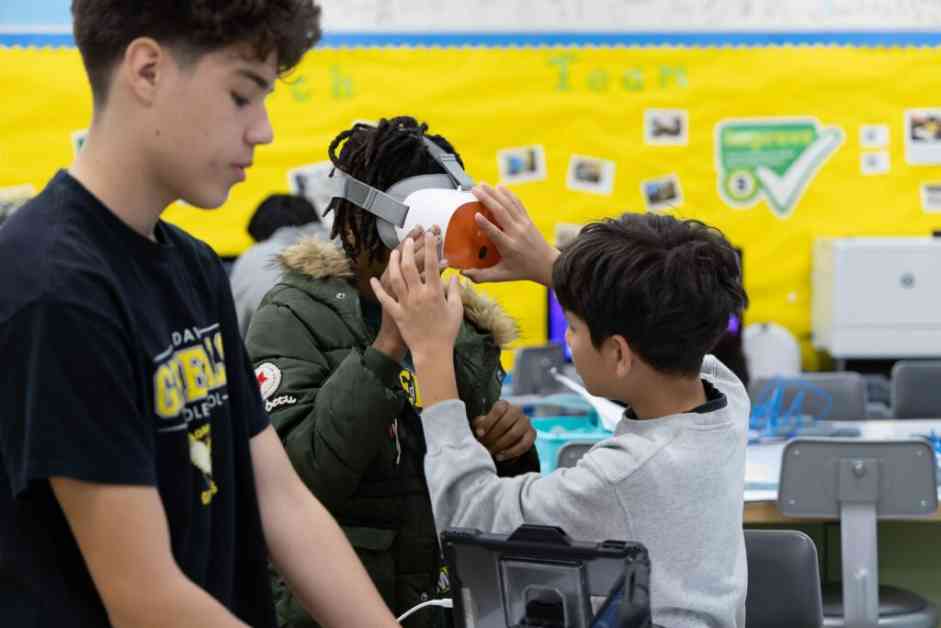AI in Education: Embracing a Thoughtful Approach
In the ever-evolving landscape of education, the integration of artificial intelligence (AI) has become a topic of heated discussion. While some view AI as a revolutionary tool that can enhance teaching and learning, others fear its implications for the future of education. Amidst the cacophony of conflicting opinions, it is essential to approach AI in education with a sense of thoughtfulness and pragmatism.
At Davis Middle School in Compton, students are already experiencing the benefits of AI integration, thanks to initiatives led by the Los Angeles County Office of Education. These efforts aim to provide students and educators with the necessary tools and resources to navigate the complex world of AI in education.
Rather than succumbing to extreme predictions about the impact of AI on education, it is crucial for all stakeholders, including teachers, staff, students, parents, and leaders, to engage in a thoughtful exploration of this technology. By understanding the potential risks and benefits of generative AI, educators can harness its power to create new frontiers of learning.
A recent needs assessment conducted in partnership between the Los Angeles County Office of Education and the nonprofit Project Tomorrow revealed a growing demand for more information about AI among administrators and teachers. With the development of responsible guidelines, such as those outlined in the artificial intelligence guidelines by Los Angeles COE, educators can leverage AI in the classroom to enhance the learning experience for students.
It is important to recognize that AI in education is not a new phenomenon. For years, AI has been utilized as a learning technology, enabling the creation of software that supports or replaces human activities in the realm of education. By harnessing data and technology, AI can make learning more accessible, efficient, and effective.
While AI has the potential to revolutionize education, it is essential to remember that it is just one of many learning technologies. Curriculum, pedagogy, and even the invention of language itself have had a more significant impact on educational outcomes throughout history. As we navigate the complexities of integrating AI into education, it is crucial to prioritize the human element and ensure that students have opportunities for meaningful interactions with their peers and educators.
One of the primary benefits of AI in education is its ability to provide scalable solutions that support students, educators, and district staff at lower costs. By deploying AI tools such as chatbots as tutors and advisors, personalized learning experiences can be enhanced. However, it is important to strike a balance between AI-guided learning and human interaction to ensure that students develop essential skills such as critical thinking, communication, empathy, and collaboration.
Rather than viewing AI as a standalone solution, educators should consider it as a tool to complement human-centered learning experiences. By incorporating AI into collaborative learning environments, students can benefit from personalized guidance while engaging in hands-on activities that promote problem-solving and critical thinking.
Experimentation is key to unlocking the full potential of AI in education. As we prepare students for an AI-powered society, it is essential to create opportunities for growth and learning in a responsible manner. Schools and districts must be supported in their efforts to navigate the complexities of integrating AI into the educational landscape while maintaining a focus on creating enriching learning environments for students.
In conclusion, the integration of AI in education holds great promise for the future of learning. By approaching AI with a sense of thoughtfulness and responsibility, educators can harness its potential to create innovative and engaging learning experiences for students. As we navigate the complexities of AI integration, let us embrace experimentation and learning to pave the way for a brighter tomorrow.
Doug Lynch, a faculty member at USC with expertise in innovation and economics, and Elizabeth Graswich, executive director of public affairs and communications for the Los Angeles County Office of Education, advocate for a thoughtful approach to AI in education. Their insights highlight the importance of balancing technological advancements with human-centered learning experiences to prepare students for the challenges of tomorrow’s world.




















